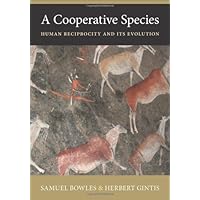 The book "A Cooperative Species" has had a few reviews recently.
The book "A Cooperative Species" has had a few reviews recently."Not so selfish" - by Peter Richerson and "Group Selection Theories are Now More Sophisticated, but are They More Predictive?" by Michael E. Price. There's also a review by Noah Mark.
Michael E. Price's review has my sympathies. He mostly focusses on one issue - but it pinpoints one of the book's problems. The modern wave of academic cultural evolution is accompanied by an enthusiasm for cultural group selection that strikes me as being wildly out of proportion. Here's Coyne on Price's review.
As recently noted, in a paper titled "The evolution of direct reciprocity under uncertainty can explain human generosity in one-shot encounters" human altruism may have been exaggerated in some of the lab experiments that purport to measure the aspects of it which seem to demand an explanation in terms of group selection.
Cultural group selection is an interesting idea - but most theorists are not even considering explanations based on cultural kin selection. Leaping for group selection before considering kin selection seems to me to be a classic mistake. Plus there are plenty of good explanations for altruism that don't invoke group selection. Despite the equivalence results, there are still reasons for choosing kin selection over group selection. The current situation is rather like the Wynne-Edwards era all over again - but in the realm of cultural evolution.
I happened to look through "A Cooperative Species" in the Boston Public Library yesterday.
The book seems quite readable and comprehensive. I would compare the book with Not By Genes Alone - which is a pretty big compliment.
However, I was most interested in what had been missed out. Looking through my list of why humans cooperate why humans cooperate the main things that were completely missing were cultural kin selection and induced cooperation - i.e. manipulation. Influences associated with cultural elements - including manipulation - are a pretty big deal in explanations of why humans cooperate the are derived from memetics.
The book does treat kin selection, signalling and reciprocity - but they are not really the "main course" of the book. That centres around multi-level selection. It doesn't seem to be the good sort of multi-level selection - that deals with kin groups - but rather the more dubious kind of multi-level selection - that deals with distantly-related strangers.
Unlike most popular works on the topic - like "The Calculus of Selfishness" and Supercooperators, Bowles and Gintis do treat cultural evolution seriously, and spend some time discussing its implications.
I also briefly looked through Moral Sentiments and Material Interests: The Foundations of Cooperation in Economic Life - edited by Herbert Gintis, Samuel Bowles, Robert Boyd and Ernst Fehr.
This book is pretty technical. Many of the pages are pretty densely packed with mathematical formulae. I thought it was on the inaccessible side.










The PNAS paper is not very plausible. In experiments, subjects are certain of anonymity.
ReplyDeleteIn real life, people are kind to strangers because they like to be kind, not because they might meet them again and require their services. This much is obvious.
Hi, H. G.! The PNAS paper claims to explain cooperative behaviour involving subjects who believe that they are in anonymous situations. The authors say:
ReplyDelete"organisms undergoing nothing but a selective regime for direct reciprocity typically evolved to cooperate even in the presence of strong evidence that they were in one-shot interactions. Indeed, our simulated organisms can form explicit beliefs that their interactions are one-shot and, nonetheless, be very likely to cooperate."
However, times when people knew that they were in an anonymous encounter may have been rare among our ancestors. Consequently, behaviour in such laboratory situations is just poor quality evidence. The situation people's brains are evolved to deal with is one where there some uncertainty about whether they are being watched. No great suprise that people cooperate unconditionally - if the loss of reputational associated with being spied on while defecting is large.
Could you elaborate on cultural kin selection? Or maybe recommend an article. I would be very grateful
ReplyDeletety
Search for the term "cultural kin selection". You'll find my "teaser" and "references" pages.
ReplyDelete